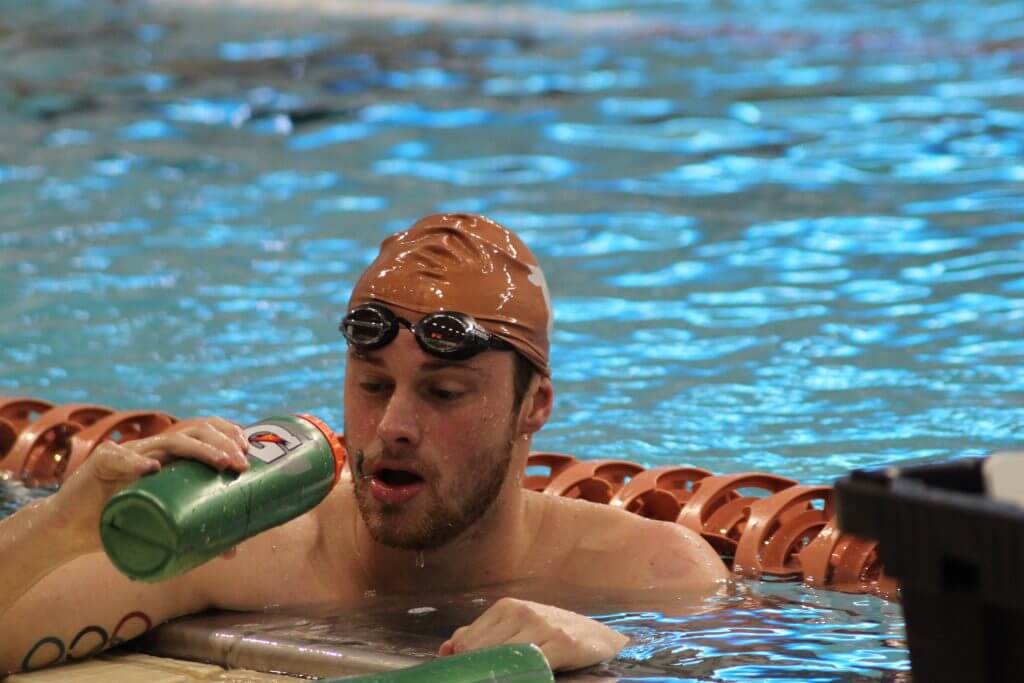Hydration and the Swimmer

By Joe Buchanan, Swimming World College Intern.
The importance of hydration is not lost on swimmers. Coaches consistently harp on the need to hydrate before, during, and after practices. Hydrating is vital to the success of all swimmers.
Why is it important for swimmers to remain hydrated?
Water is required by the body to function while exercising. Water is essential in the transportation of red blood cells throughout the body, as well as the formation of protein and glycogen. All these functions are needed for the growth and recovery of muscles. Hydration also helps regulate the body’s temperature and helps lubricate joints, both of which are vital to success while swimming.
With a lack of hydration, swimmers can experience early onset fatigue during workouts, poorer response times, an increase in the risk of injuries, and sharp rise in the risk of cramping both inside and outside the pool. Dehydration of any degree can negatively affect a swimmer’s performance in the water.
How do I avoid dehydration?
There is debate over how much water a person should drink to stay hydrated. The Institute of Medicine recommends 3.7 liters a day for men age 19-30, and 2.7 liters a day for women age 19-30. A common rule of thumb that’s often stated for remaining hydrated is to take one’s body weight, divide it by two, and drink that much water in ounces.
Both of these techniques work effectively to hydrate the normal adult, however swimmers need to remain conscientious of the fluids they lose in the water. Swimmers especially run the risk of dehydration this way as it’s hard to tell if they are sweating, let alone how much. The most accurate way to check your hydration levels are to check your urine. Urine that is pale to light yellow indicates proper hydration, the darker the urine is, the more dehydrated someone is.
It is recommended that swimmers drink at least 16 fluid ounces of water two hours prior to working out and to consistently rehydrate during the workout to avoid any fatigue that could come from dehydration. Swimmers are also encouraged to hydrate following workouts to replenish any lost fluids and to promote recovery of muscles.
Alcohol and caffeine can also cause dehydration as they are diuretics. A diuretic is a substance that causes an increased production of urine by blocking the hormone that is used to reabsorb water in the kidneys and instead turns the fluid straight into urine. This increase in urine directly correlates with the dehydration of the body.
The best way to avoid dehydration is to know the signs:
- Thirst,
- Headaches,
- Weakness,
- Fatigue,
- Dizziness
All commentaries are the opinion of the author and do not necessarily reflect the views of Swimming World Magazine nor its staff.
All swimming and dryland training and instruction should be performed under the supervision of a qualified coach or instructor, and in circumstances that ensure the safety of participants.




Adriel Natan
Kyle Haake
Ginny Fimmano just a reminder why you need to drink enough water
You’re always looking out for me
That’s what friends are for
Looks like Mike Watson!
Cabrini Johnson
Callum Gannon you should read this
Marie-France Moses Alice Allard Moi avec mes trois bouteilles par pratique
Tellement AHAHAHA?
? t’es trois bouteilles plus les nôtres
Michelle Maffett Gallagher
See?!
Linda Irish Bostic
Hydrate hydrate hydrate!!!
Emm Yann Rodrigo Ortiz Luis Gerardo Rios Abraham Vargas Gochi
Layya Bayya
My entire speech in one article
Why people still make use of to read news papers when in this technological globe all is accessible on web?